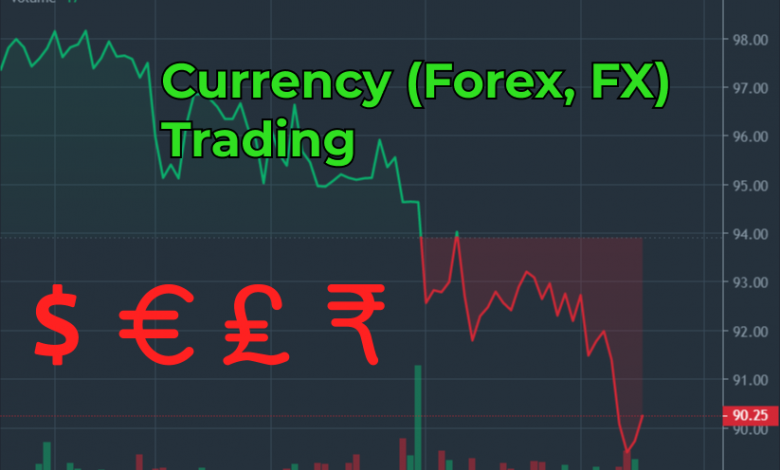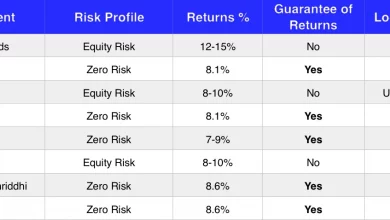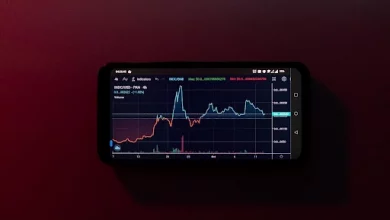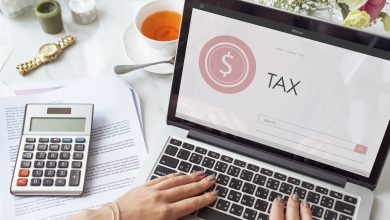All about Currency (Forex, FX) Trading in India 2022

Learn answers to some of the most frequently asked questions about Forex (Currency) trading in India on the internet in 2022.
Forex Trading in India -How Does it Work?
Forex trading is the practice of exchanging or trading currencies for the purpose of profit. Trading typically occurs on a decentralized market known as the Foreign Exchange (Forex) market. The FX market has turned into one of the most appealing locations for financial investing, with daily turnover exceeding 5 trillion USD. However, Foreign Exchange trading in India is still very much in infancy. Only the INR-based currency pairings are authorized to be traded by forex dealers in India.
The value of currencies in the market fluctuates throughout time as a result of many socioeconomic variables. As a result of the price variations, financial investors or traders might benefit from currency exchange. It’s crucial to remember that in forex trading; currencies are traded in pairs which always has two currencies, such as EUR/USD, USD/INR, INR/GBP, USD/CAD, and so on, one of which is regarded as the base currency and the second currency is referred to as the quote.
In this article, we will provide you some insight and answers to some of the most frequently asked questions about Forex trading in India on the internet. Find yourself a comfortable position, relax and read on to the end.
Contents
Is it Legal to Trade Forex in India?
Absolutely yes, in India, forex trading is legal. However, it is subjected to some rules and regulations as advised by SEBI and controlled by RBI guiding the trading of forex in India so as to reduce risk in the forex market. Traders are not permitted to engage in foreign exchange trading using any online or electronic-based forex trading on Indian territory no matter the circumstances.
The RBI issued a circular in the year 2013 prohibiting currency trading via internet or electronic trading. Forex trading, on the other hand, is permitted if performed using designated forex trading platforms using the Indian Rupee currency as the base in any currency pair in the market.
To put it another way, the Government of India restricts Indian residential traders from trading currency pairings that are not benchmarked against the Indian Currency.
As a result, Indian residents are allowed to only trade the forex market provided that they do so via a designated Indian brokerage that allows Indian exchanges like the Bombay Stock Exchange (BSE), the National Stock Exchange (NSE), or the Metropolitan Stock Exchange (MCX-SX now MSE), and as well as currency derivatives.
How Do You Trade Foreign Exchange in India?
Forex trading is legally permitted in India, as previously stated, however, you may only exchange currency pairings that involve INR (Indian Rupee). The Indian Rupee’s weakness versus the US Dollar is one of the main reasons for this restriction. If Indian traders wish to purchase the US dollar, they are mandated to do it through the Central Bank of India.
Foreign exchange platforms like BSE, MSE, and NSE are all options for Indian resident traders. The Securities and Exchange Board of India (SEBI) was created in the year 1992 to oversee and govern the Indian foreign exchange market.
The Securities and Exchange Board of India (SEBI) is the Indian regulatory body in charge of forex-regulated enterprises, safeguarding forex dealers, and securities issuers. As a result, Forex brokers providing services to Indian citizens must be licensed by SEBI.
How to Start Forex Trading in India
Foreign exchange (FX) trading is advised only to be tried out after you have thoroughly educated yourself on the subject. There are a few steps you need to follow when getting started with FX trading in India if you have a good understanding of the basic concepts and methods. These stages are detailed below:
Step 1: Choose Your Forex Trading Instrument
When trading forex, you have the option of using a laptop, tablet, smartphone, or a traditional desktop computer. If you want to trade while on the move, finding a forex broker that offers a good forex trading app is critical. With currency pairs’ prices fluctuating so often, having one or two gadget that allows you to conduct trades fast will be critical to your foreign exchange trading career success.
Step 2: Locate a Forex Broker Online.
For FX traders in India, there are a lot of foreign exchange brokers to choose from online, each with its own set of services, tools, and costs. Any forex broker you decided to go for should suit your trading strategy and style, degree of experience, trading requirements, and budget, including a wide range of instructional materials to assist you to develop your trading expertise. Above all, be certain that the broker you select enables the trading of Indian Rupee for clients.
Also, be careful to find out if the broker is licensed or not and by who; brokers providing services to Indian traders must be governed by the Reserve Bank of India (RBI), the country’s currency regulator.
Step 3: Create a user account.
On the chosen forex broker’s website, you will be able to create a new trading account. To open an account with some forex brokers, a certain deposit is required. These forex brokers also provide several types of accounts depending on your financial objectives. Go for the one that is best for you.
Step 4: Make a deposit into your account.
After you’ve created an account with your chosen broker, you’ll have to deposit some money in order to begin trading forex. You may pick your native currency and load your account with funds in a variety of ways, depending on the forex broker you are using. Wire transfers, debit cards, and Band deposits are the most common financing methods.
Step 5: Install a forex trading platform on your computer.
On any of the gadgets you decided on using, you will have to install your chosen FX trading platform. Invest some time in personalizing the platform’s appearance and feel so as to help you get the most out of your FX trading.
Step 6: Get started with your forex trading.
After completing all the previous steps, before thinking of trading the real market with your hard-earned money. Try practicing with virtual funds on a demo account. These will surely help you master your trading strategy and get acclimated to the forex broker’s platform interface without risking any money. You can start forex trading with your real funds when you feel more comfortable with your performance and the platform.
Best Forex Trading Strategies in India
You’ll need to master certain forex trading techniques in order to become a good forex trader. However, because the number of methods available might be overwhelming, we recommend that you begin by getting acquainted with the most effective forex trading techniques first. This will help you stay on track.
Scalping
Scalping is a method that some FX traders use in making a series of smaller deals. To guarantee minimal margins, you might select the entry and exit trading positions with minimal currency fluctuations.
Scalpers must be able to execute trades precisely in order to be successful. These short-term deals usually last between a minute to an hour. It will be critical to always stay ahead of currency movements in order to successfully execute scalping.
Day Trading
Day trading is a type of trading strategy that entails traders opening and closing trades on the same day. These deals might take anything from a few minutes to several hours. As a result, traders are less likely to suffer massive losses due to overnight market volatility.
If you’re new to FX trading, day trading is a simple and straightforward way to start making money. Day trading is an excellent strategy to reduce risk while increasing your chances of success.
Swing Trading
Another common method used by investors is swing trading, which involves trading foreign currencies throughout a complete day or week. Traders can deflect the frequent highs and lows of currency pairings with this technique since it gives them ample time. With this trading strategy, you may go through needless stop losses on your way to success.
Position Trading
Another popular forex trading technique in India is the position trading strategy, which involves traders holding open positions for an extended period of time. Trades with this method might last a week, months, or even years. Investors can profit from greater price changes in currency pairings without having to pay attention to smaller market fluctuations.
With these trading techniques, you may also establish your entry and exit positions for extended periods of time. Overall, this trading technique entails staying informed about global socio-economic policies and impactful events.
Range Trading
The final on the list of our major trading methods in India is range trading. This technique entails examining historical data for currency pairings in order to spot market patterns.
You can establish a larger entry and exit trading position regarding the financial facts in order to profit from prior price patterns. It’s a safer option than day trading due to the measured risks involved.
FAQ
Is forex trading in India taxable?
In India, FX trading is really a taxable source of revenue. According to the new GST law, taxes on foreign earnings might range from 5percent to 18percent.
Who can trade in the Forex markets?
The forex market is traded by many players such as financial institutions (i.e. commercial banks, central banks), Global corporations, money managers, Individuals (retail traders), and hedge funds.
As a result, the reason for which these market players choose to trade derivatives defines them. The following are the key stakeholders in a derivative market, according to their unique needs:
Hedgers:
Hedgers are investors that are seeking to reduce their risk. In a financial market, a hedger would normally attempt to reduce his asset’s vulnerability to price volatility by taking a trading position that is the polar opposite of the risk they are otherwise vulnerable to.
Speculators:
As the term implies, make predictions about market changes and take trading positions that increase profitability. Speculators are known as high-risk takers who are solely interested in generating money in the forex markets.
Arbitrageurs:
The Arbitrageurs are the final big players. They play in a very fast-paced atmosphere where judgments are made on the spur of the moment. Compared to its price in the forex market, the stock price in the cash market is either lower or greater than it should have been. Arbitrageurs profit from the flaws and weaknesses in the system. They also play a significant role in improving market liquidity.
Is it possible to profit from FX trading in India?
Yes, by utilizing efficient trading methods and funds management guidelines, you can make some cool cash out of trading forex.
Takeaway
While foreign exchange trading is the most dynamic and biggest market in the world, it has yet to establish a strong foothold in India. Due to this, several Indian Investors are still undecided on whether or not to enter the lucrative forex market. If you are an entrepreneur or investor who wants to learn and start foreign exchange trading in India but isn’t sure where to begin, we believe this comprehensive guide gave you some insight on basic things you need to know.




